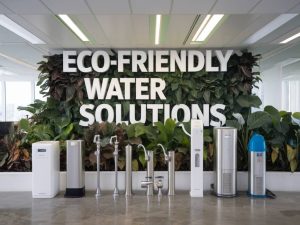sustainable water solutions: how businesses can go green

sustainable water solutions: how businesses can go green
Water is a vital resource for life and industry. As awareness of environmental impacts grows, businesses are increasingly looking to sustainable solutions. Embracing sustainable water solutions not only reduces environmental footprints but also often leads to cost savings. Here’s how businesses can integrate green practices into their water management strategies.
Understanding the Importance of Sustainable Water Solutions
Water sustainability isn’t just a trend; it’s a pressing necessity. Increasing pressures from climate change, population growth, and industrial demands are straining water resources worldwide. For businesses, sustainable water solutions mean managing consumption wisely, minimizing waste, and protecting natural ecosystems. It also aligns with corporate social responsibility initiatives, enhancing brand reputation and compliance with regulations.
Assessing Water Usage in Businesses
To integrate effective sustainable water solutions, businesses need to start by analyzing their water usage. Companies should conduct detailed water audits to understand where and how water is being used. This audit identifies usage patterns, wastage points, and potential areas for conservation. By understanding these dynamics, businesses can implement targeted strategies to reduce water consumption.
Implementing Water-Efficient Technologies
Investing in water-efficient technologies is one of the most effective ways to reduce water use. Businesses can upgrade fixtures to low-flow devices, install dual-flush toilets, and leverage sensor-based taps to minimize water waste. Enhancements in industrial processes can also contribute significantly. Technologies like closed-loop water systems and efficient cooling towers help industries conserve water substantially.
Recycling and Reuse Strategies
Recycling and reusing water within business operations is crucial for sustainability. Greywater systems, which recycle water from sinks and showers, can be used for irrigation or toilet flushing. Companies can also implement rainwater harvesting systems to capture and utilize rainwater, reducing reliance on municipal sources. Industries can treat and reuse process water, thereby minimizing discharge and conserving water resources.
Incorporating Nature-Based Solutions
Nature-based solutions integrate natural processes to manage water sustainably. Businesses can employ green infrastructure like green roofs, wetlands, and bio-retention systems to enhance water retention and quality. These systems not only help in stormwater management but also contribute to urban biodiversity and cooling, creating healthier environments. By aligning their water usage with natural cycles, businesses can achieve long-term sustainability.
Setting Water Reduction Goals
For businesses serious about sustainability, setting measurable water reduction goals is essential. These goals should be specific, achievable, and time-bound, aligning with the overall sustainability vision of the company. By benchmarking progress through regular monitoring and reporting, companies can drive accountability and continuous improvement. Transparency in reporting also strengthens stakeholder trust and engagement.
Employee Engagement and Training
Engaging employees in water conservation efforts is vital. By fostering a culture of sustainability, businesses can achieve their water goals more effectively. This can be achieved through regular training programs highlighting the importance of water conservation and the role employees play. Encouraging staff to identify and report leaks or suggest water-saving ideas can create a sense of ownership and participation.
Partnerships and Collaboration
Collaboration with stakeholders, including suppliers, customers, and local communities, can enhance the impact of sustainable water initiatives. Businesses can partner with water sustainability organizations to benefit from expert guidance and resources. By working together, companies can innovate and share best practices, multiplying the positive effects on water conservation.
Economic and Environmental Benefits
The adoption of sustainable water solutions yields significant economic and environmental benefits. By reducing water consumption, businesses can lower utility costs, contributing to better financial performance. Environmentally, it leads to reduced stress on water resources, lowers emissions from water treatment and distribution, and protects ecosystems. Moreover, sustainable practices can open up new market opportunities and enhance competitive advantage.
Overcoming Challenges in Water Sustainability
Implementing sustainable water practices can face several challenges, such as financial constraints, lack of expertise, and resistance to change. However, businesses can overcome these by leveraging incentives and grants aimed at promoting sustainability. Investing in training and hiring sustainability experts can also bridge knowledge gaps. Emphasizing the long-term benefits such as cost savings, regulatory compliance, and brand enhancement can help in managing resistance.
The Future of Water Sustainability in Business
The future of sustainable water solutions in business looks promising, driven by technological advancements and increasing pressures on water resources. Emerging technologies like intelligent water management systems and blockchain for water tracing are set to revolutionize how businesses manage their water resources. As awareness and regulations grow, integrating sustainability into core business strategies will become indispensable.
Individuals and companies making informed and responsible choices can significantly contribute to water conservation. By prioritizing sustainable water solutions, businesses not only act as stewards of this precious resource but also pave the way for a sustainable future. Together, these efforts create a resilient economy, a healthy environment, and a thriving society.





